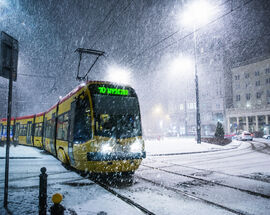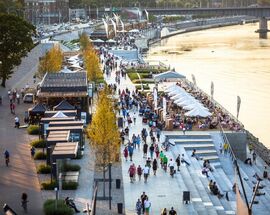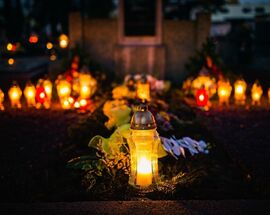Jump to:
- Climate
- Customs
- Electricity
- Facts & Figures
- Health & Emergency
- Internet
- Law & Order
- Market Values
- Money
- National Holidays
- Post
- Public Toilets
- Religion
- Water
Climate
Poland has a temperate climate with hot summers and cold winters. Seasons tend to be more pronounced than in the west and temperatures can get down as low as -20 C in winter and as high as +30 C in summer. The coldest weather tends to hit around February although the long winter of 2009/10 saw a record low temperature in Poland of -32 degrees.Customs
If you are travelling within the EU those over 18 can now take 10 litres of spirits, 90 litres of wine and 110 litres of beer. Most countries will not allow more than 800 cigarettes from Poland. If purchasing art or books, you need to consider their age and value. In order to leave the country, art must be both less than 50 years old and under a certain value (varies depending by type; photos under 6,000zł, other art under 16,000zł, for example); if these conditions are met, the gallery curator can then provide you with a 'zaświadczenie' (permission document) describing the artwork's price and when and where it was created. If the work exceeds the permitted age or value, you must get permission from the 'Wojewódzki Konserwator Zabytków' (Regional Curator's Office) to take it out of Poland; bear in mind that this process will likely take 2-3 months. Books must be less than 100 years old and under 6,000zł in value in order to leave the country; if neither applies, permission must be obtained from the National Library. Obviously, problems arise when purchases are made at bazaars or flea markets where vendors cannot provide the necessary documents; if there is any doubt about the value or age of your purchase, we suggest you visit an 'Antykwariat' (antiques dealer – see shopping) for advice.Electricity
Electricity in Poland is 230V, 50Hz AC. Plug sockets are round with two round-pin sockets. Therefore if you are coming from the UK, Ireland or the US you are definitely going to need a plug convertor. The best place to pick these up is at home, although if you do arrive without a covertor you can try your hotel concierge or reception. If they don't have one the best place to pick one up is at Media Markt (stores are all over town) or an Empik (also all over town but there's one close to the central train station in Warsaw). Our advice is save yourself the hassle and get one in the airport as you leave.Facts & Figures
Territory
Poland covers an area of 312,685 square kilometres and is the ninth biggest country in Europe by area. It borders the Baltic Sea (528km) and seven countries, namely (moving clockwise) the Russian enclave of Kaliningrad (210km), Lithuania (103km), Belarus (416km), Ukraine (529km), Slovakia (539km), Czech Republic (790km) and Germany (467km).
Longest River
Warsaw is split by the river Vistula (Wisła). At 1,047km it is Poland’s longest river and flows into the Bay of Gdańsk (Zatoka Gdańska).
Highest Point
The highest peak in Poland is Rysy (2,499 metres) found in the Tatra mountains in the south of Poland.
Population (2023)
Poland - 36,620,970 (these are the only numbers from the 2024 census)
Warsaw - 1,863,056
Kraków - 804,237
Łódź - 655,279
Wrocław - 674,132
Poznań - 540,146
Gdańsk - 486,492
Katowice - 286,960
Local Time
Poland is in the Central European (CET) time zone (GMT+1hr). When it’s 12:00 in Warsaw it’s 6:00 am in New York City, 11:00 in London, 12:00 in Paris and Berlin and 19:00 in Tokyo. Polish summer time (GMT+2hrs) starts and ends on the last Sundays of March and October.
Health & Emergency
In the case of an emergency, mobile phone users should dial 112 to be forwarded to the police, fire department or ER. From a landline or public phone dial the following: Ambulance: 999; Fire: 998; Police: 997.English, German and Russian speakers have separate lines specifically designed for foreigners in distress: +48 608 599 999 or +48 22 278 77 77. Both numbers can be reached from a mobile phone or a land-line and are hotlines in case you run into any troubles during your stay. The lines are active year round with later hours during the high-tourist season.
For urgent medical emergencies, a list of Emergency Rooms can be found in the Directory section of this guide. If you've woken up to find you've got a raging headache, a swollen foot you can't put weight on and vague memories of some kind of calamity, we suggest you sort it out by calling a private clinic, thus avoiding the hassle of the notoriously long queues in Polish hospitals; a list of private clinics can also be found in the Directory. Further help can be provided by embassies and consulates, a list of which can also be found in the Directory.
Internet
Internet access is typically free and widely available in Poland, with practically every café and restaurant offering wi-fi to customers with laptops and smartphones. Getting on the network often requires nothing more than a password, which you can request of your favorite bartender or barista with a simple, “Poproszę o hasło do internetu” If you don't have your own gadgets we offer a few Internet cafe options (see Internet Cafes in Directory).Law & Order
In general Warsaw is far safer than most Western cities, and visitors are unlikely to face any problems. Petty crime does exist, and travellers should be on guard against pickpockets working tram and bus routes by the train station. If you’re in a bar or a restaurant keep your wallet and phone inside your trouser pocket, not inside a jacket casually left lying around. Those travelling by car are advised to use a guarded car park. Avoid being ripped off by opportunistic taxi gits by using clearly marked cabs, something to bear in mind around the train station and airport. The officially sanctioned state company MPT (tel. 22 19191) is possibly the best bet, and their switchboard features English speaking operators. Otherwise, grab an Uber, which tend to be a very safe bet.Staying on the right side of the law is significantly easier for tourists who accept that Polish beer and vodka are rocket fuel and drink accordingly. If you’re determined to make an idiot of yourself then make sure it’s not in front of the law. In recent years visitors ranging from folks in Chewbacca costumes to complete fools who’ve thought it’s perfectly acceptable to drop trousers and urinate in a city centre fountain have tested the patience of the local law enforcement. Their tolerance threshold is now decidedly low so don’t push your luck. Those who do may well be treated to a trip to Warsaw’s premier drunk tank (ul. Kolska 2/4), a chastening experience which will set you back 350zł for an up to 24 hour stay. In return for your cash expect a strip search, a set of blue pyjamas and the company of a dozen mumbling vagrants. Not to mention a hefty fine (credit cards not accepted, of course).
The other well-known ways tourists can cross cops is by jaywalking. If you are from a country which has no (or doesn’t respect) jaywalking laws, you'll be surprised to see a crowd of people standing obediently at a crossing waiting for the lights to change. The reason for the obedience of this particular rule is the fact that the local city police (Straż Miejska) will quite freely give you a 50-100zł fine for crossing a road at a place where no crossing is marked or a 100zł fine when the ‘walk’ light is red. And don’t think you are exempt by being a foreign visitor. You are subject to the law too and your non-residency means you will need to pay the fine on the spot.
On that same note, remember that if you get on a tram, bus or train, you must have some kind of ticket. You can usually buy them on board (don't buy too many at once! The ones you get on board are validated right there, meaning you can only use them for that trip). You may not always see ticket collectors but believe us - they are definitely common and dressed in mostly plain clothes with little indication of who they are. However, as soon as the bus or train or tram starts moving, they will begin walking around and checking tickets so make sure you've bought one either onboard or at a ticket station before you get on. If you don't have a ticket (even if you're a foreigner) you'll face a 150-200 zł fine.
You can also use Jakdojade, an easy phone app to buy digital tickets on your phone.
Market Values
Prices in Poland are still fairly competitive despite increases over the last couple of years particularly in the prices of cigarettes. Here are some typical everyday products and prices.
|
Market values as of May 21, 2019 based on €1 = 4.28zł |
||||||||||||||||||||||||||||||||||||||||||||||||||||||||||||||||||||||||||||||||||||||||||||||||||
| Product | Price (zł) | Price (€) | ||||||||||||||||||||||||||||||||||||||||||||||||||||||||||||||||||||||||||||||||||||||||||||||||
| McDonald's Big Mac | 10.50zł | €2.45 | ||||||||||||||||||||||||||||||||||||||||||||||||||||||||||||||||||||||||||||||||||||||||||||||||
| Snickers | 1.89zł | €0.44 | ||||||||||||||||||||||||||||||||||||||||||||||||||||||||||||||||||||||||||||||||||||||||||||||||
| 0.5ltr vodka (shop) | 25.00zł | €5.83 | ||||||||||||||||||||||||||||||||||||||||||||||||||||||||||||||||||||||||||||||||||||||||||||||||
| 0.5ltr beer (shop) | 2.99zł | €0.70 | ||||||||||||||||||||||||||||||||||||||||||||||||||||||||||||||||||||||||||||||||||||||||||||||||
| 0.5ltr beer (bar) | 10.00zł | €2.33 | ||||||||||||||||||||||||||||||||||||||||||||||||||||||||||||||||||||||||||||||||||||||||||||||||
| Loaf of white bread | 2.70zł | €0.63 | ||||||||||||||||||||||||||||||||||||||||||||||||||||||||||||||||||||||||||||||||||||||||||||||||
| Pack of Marlboros | 16.00zł | €3.73 | ||||||||||||||||||||||||||||||||||||||||||||||||||||||||||||||||||||||||||||||||||||||||||||||||
| 1ltr of unleaded petrol (98) | 5.12zł | €1.19 | ||||||||||||||||||||||||||||||||||||||||||||||||||||||||||||||||||||||||||||||||||||||||||||||||
| Local transport ticket (1 journey) | 4.40zł | €1.03 | ||||||||||||||||||||||||||||||||||||||||||||||||||||||||||||||||||||||||||||||||||||||||||||||||
Money
Currency can be exchanged at airports, hotels, banks and anywhere with a sign proclaiming 'Kantor.' Kantors will often provide better value than the banks in your home country or the ATM although for obvious reasons be very wary of kantors in the airports, bus stations and close to tourist sites. Shopping around will reward you with the best rate. For a list of kantors in Warsaw that won't rip you off, see our Services Directory.Since EU ascension and becoming a favoured tourist destination, prices in Poland have been on the rise, making the country less of a bargain than it was fifteen years ago. Having said that, however, prices for food, drink, cultural venues and transport still remain comparably cheap in contrast to Western Europe. A ticket to the cinema typically costs 17-35zł, while admission to most museums costs around 15-30zł.
Thinking of paying for your tram ticket with one of the 100zł notes in your pocket, though? Think again. Shops, newsagents, public toilets, and even the occasional restaurant or bar, will often refuse to break a large note for you. As annoying as coins can be, they are essential if you intend to pay in cash, so hang on to your change - you'll need it.
Although well behind in terms of service and properly stocking the register before opening for business, Poland is ahead of the curve when it comes to cashless transactions. Credit or debit can be used just about anywhere (except for obwarzanki vendors and outdoor markets). Those making purchases with a credit card whose base currency isn’t Polish złoty, should beware however (and unless you’re Polish, this probably means you). If you are asked by a merchant, wait staff or on the card reader itself whether you want to be charged in your home currency or PLN, always choose złoty. Why? Because the companies that process credit card transactions typically tack on fees for converting the money, and then do so at a lousy exchange rate. Depending on the size and number of your purchases while in Poland, the cost can really add up. Visitors should be vigilant and monitor receipts when paying with a credit card - should you be charged in your card's original currency, don't be afraid to insist on having your purchase refunded and charged again in złoty.
National Holidays
With a full calendar of religious holidays, seasonal traditions and name days, it seems there's always something being celebrated here in Poland. Not to be confused with unofficial holidays like Women's Day (March 8th), national holidays that are still regular work days like the Day of Pope John Paul II (October 16th), or the rash of spontaneously decreed days of national mourning that occur each year, below we list Poland's annual non-working public holidays:
January 1, 2019 New Year's Day
January 6, 2019 Three Kings
April 1, 2019 Easter Sunday
April 2, 2019 Easter Monday
May 1, 2019 Labour Day
May 3, 2019 Constitution Day (May 3, 1791)
May 20, 2019 Pentecost Sunday
May 31, 2019 Corpus Christi
August 15, 2019 Assumption of the Blessed Virgin Mary, also Polish Army Day
November 1, 2019 All Saints' Day
November 11, 2019 Independence Day (Nov 11, 1918)
December 25, 2019 First Day of Christmas
December 26, 2019 Second Day of Christmas
- All Saints' Day
- Christmas
- Corpus Christi
- Easter
- Independence Day
- May Days
- Polish Army Day
- Three Kings
Post
A bureaucratic nightmare buried under paperwork riddled with illegible stamps and seals, there is no indication that Poland's postal service - Poczta Polska - will be automated or computerised during our lifetimes. There can be no doubt that the post office is one of the most frustrating places to be a foreigner in Poland, as you're guaranteed to not understand a damn thing happening there. Your best ally is the person in line next to you; if there's one person in the room who speaks not a word of English, it's the qualified clerk at the service window. Also, don't expect any signs to feature English translations, though all paperwork has been mystifyingly translated into French (and only French). When you get to the head of that insufferably long queue, don't be surprised to be sent to another or back to the end, paperwork in hand. The declaration that your nicely wrapped parcel is somehow 'unacceptable' is another popular reason why you might find yourself ready to 'go postal', though there are many others.If sending something of any monetary or sentimental value, please, make sure you do so by using priority mail or better; magic word: 'Priorytet.' Choosing the cheapest overseas option available will ensure that your package takes months to arrive and is heavily tampered with en route. We're not exaggerating.
All post offices are marked on the maps in the back of our print guides; with the exception of Central Post Office (ul. Świętokrzyska 31/33, A-3, open 24hrs) most close early on Saturday, if open at all, and all will be closed Sunday.
Public Toilets
Generally speaking, toilets in Poland come marked with a circle for women, and a triangle for men. Remember to bring change if you're in a public area because some public restrooms still require you to pay around 1 zł for access (annoying, we agree!)Religion
For over one thousand years Poland has been a bulwark of Catholicism, fighting against the horrors of pagan invasions and looking to Catholicism for a sense of social and national unity. When Poland was partitioned in the 19th century, many turned to the church for solace and during the communist era, underground resistance meetings were surreptitiously held in churches.The deceased Polish-born Pope John Paul II remains a genuine source of pride for all Poles, and is beloved in a way more profound than cynics in the West can understand. Many Poles genuinely believe that John Paul II single-handedly started the overthrow of Communism in Central and Eastern Europe. Small wonder then, that your average Pole takes Catholicism very seriously. Those used to the more easy-going habits of the West may find the Polish enthusiasm a bit unnerving at first, particularly the solemn and opulent processions that occur from time to time and the droves that flock to mass.


_m.jpg)



